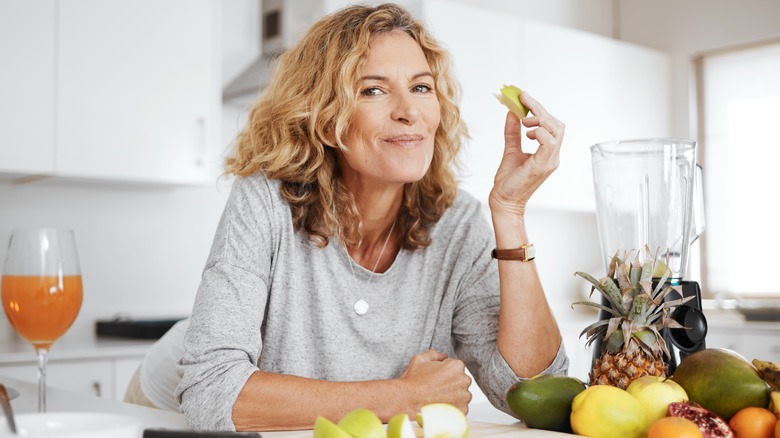What Happens To Your Brain When You Eat Fruit Every Day
While some keto or high-protein diets swear off fruits for their high sugar content, fruits have nutrients many people lack, such as fiber and potassium. Many of your favorite foods might be high in fat, sodium, and cholesterol, but you won't find them in fruit. The nutrients in fruit can manage your cholesterol, reduce your risk of heart disease, and lower your blood pressure. The vitamin C in fruit helps your body repair tissues and heal wounds, according to the U.S. Department of Agriculture.
Fruit is also great for your brain health. A 2021 study in Neurology followed more than 75,000 people for several years and tracked their food and memory decline. After considering factors such as age and overall diet, people who ate more foods rich in flavonoids, like strawberries and oranges, had a lower likelihood of experiencing memory decline. Other studies have found that the flavonoids in fruit protect your brain.
How fruit protects your brain
A 2023 article in the Journal of the Science of Food and Agriculture says that gut bacteria change flavonoids into metabolites to improve cognitive health. Flavonoids also balance the health of your gut bacteria to reduce cognitive decline. Citrus fruits such as lemon, bitter orange, and mandarin also have flavonoids that can protect your brain, according to a 2022 article in Nutrients. Specifically, hesperidin and hesperetin can protect the brain from forming amyloid plaques, often tied to Alzheimer's and Parkinson's disease. These flavonoids also work as antioxidants and can reduce the degeneration of brain cells.
According to a 2022 article in Molecular Nutrition and Food Research, foods with flavonoids, specifically cocoa, ginkgo, and berries, can improve brain performance such as memory, processing speed, and mood. The study found that flavonoids mostly benefited middle-aged and older adults. You don't even have to eat these foods throughout your lifetime to boost your brain health. You could see an improvement in your cognitive health in as little as six weeks.
How much fruit you need
The USDA says you can enjoy whole fruit, juices, or dried fruit, but you should get the majority of your daily fruit intake from whole fruit rather than juice. A serving of fruit can be a cup of whole fruit, ½ cup of dried fruit, or a cup of 100% fruit juice. A large banana, a small apple, 8 strawberries, and 22 seedless grapes all count as a serving of fruit. Women over 19 need at least 1½ servings of fruit a day, and men over 19 should aim for at least 2 cups.
If you're aiming for brain health, you may want to include blueberries in your diet. They have vitamin C, vitamin K, and other nutrients that can boost your focus because they improve blood flow and oxygen to your brain. Martha Clare Morris, Ph.D., who developed the MIND Diet to improve brain health, advocates eating berries at least twice a week to benefit your brain (via Rush University).



